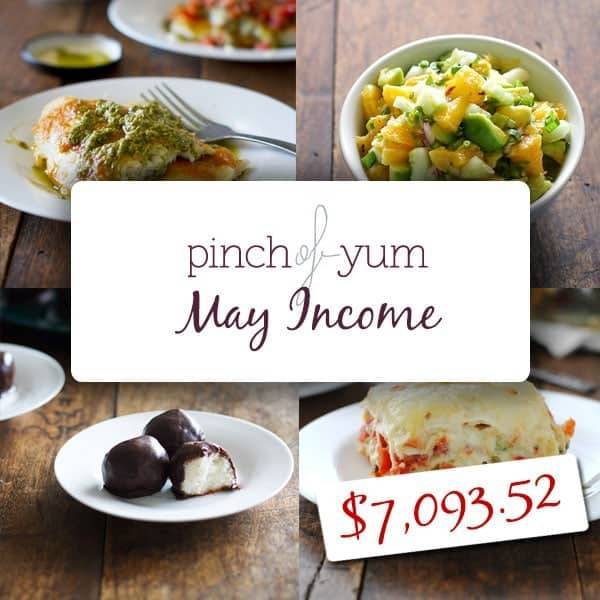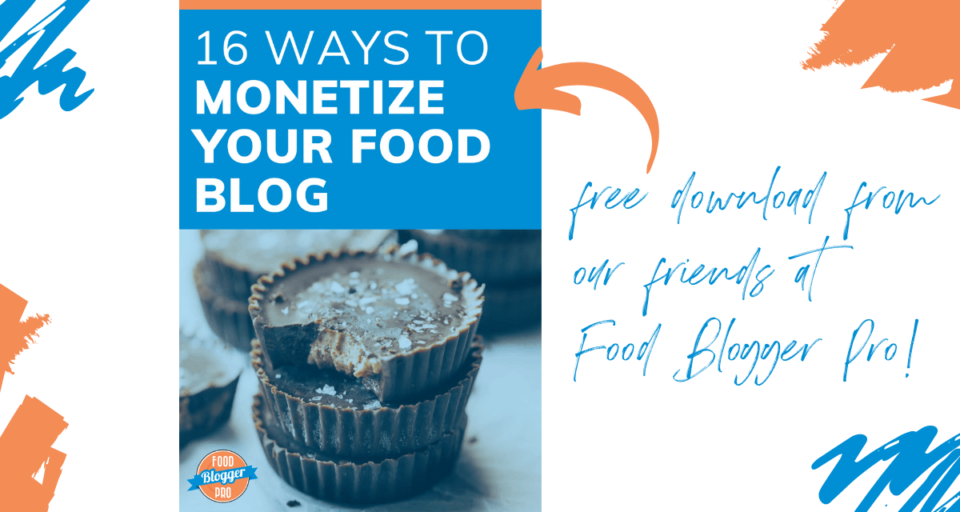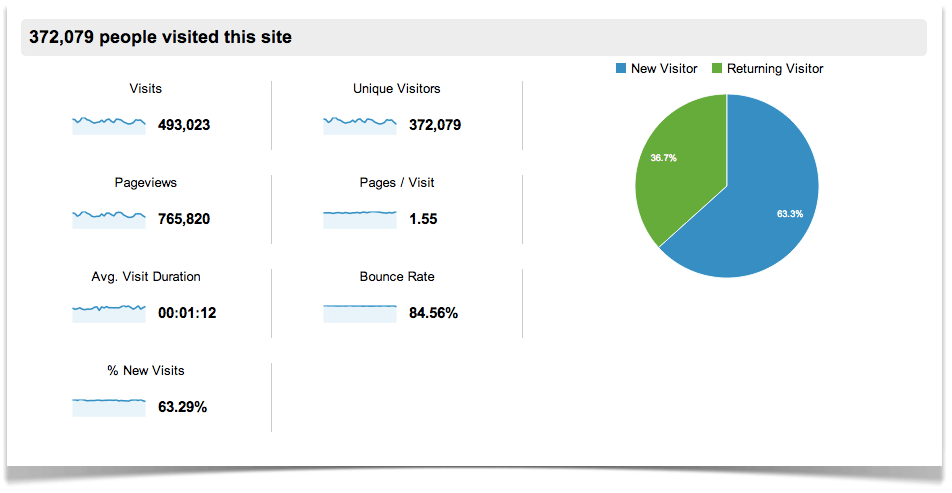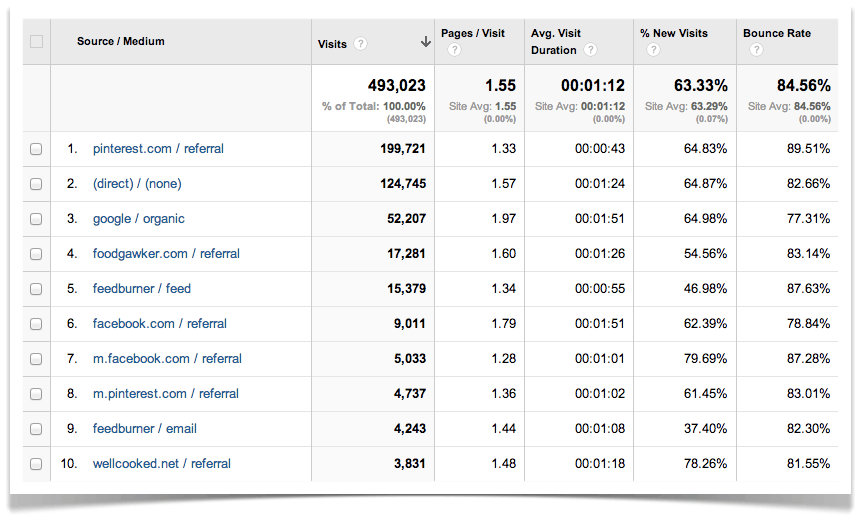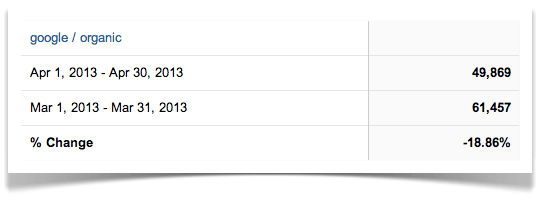So, what is this post all about, anyways? Every month I put together a report that includes nitty-gritty details about Pinch of Yum. I focus on two things (1) the income and expenses and (2) the traffic. I also include any tips or tricks that we’re learning as we continue to find ways to grow the blog. Our hope with these reports is that they provide insight and inspiration as you start and grow your own food blog.
Income
Total Income:: $8,457.98
Expenses
Total Expenses: $1,364.46 Net Profit: $7,093.52 If you’re interested in learning more about some of the ways that you can monetize a food blog, we encourage you to download this free ebook, “16 Ways to Monetize Your Food Blog,” from our sister site, Food Blogger Pro!
Thoughts On Income
May was the best month we’ve ever had on Pinch of Yum in terms of total income ($8,457.98). This is largely due to the fact that it was a really good month for BlogHer earnings. Another number that caught my eye was the Ziplist Recipe Box earnings. The total income isn’t substantial, but the increase compared to last month’s earnings is noteworthy, and I think it has the potential to continue to grow and eventual become a decent source of income. In last month’s traffic and income report I talked about changing the color of the links on Pinch of Yum in order to make them stand out more, therefore increasing the number of clicks. We looked at the specific example of our How to Start a Food Blog page, where we noticed that the purple links negatively impacted the number of clicks on affiliate links. We decided to change those purple links to a light blue link to make them stand out more. As promised I wanted to report back on the results of that change. In April we had a total of 368 clicks, and after making the change in May we had a total of 444. While there are many factors that go into the amount of clicks, I believe that changing the link color positively effected the number of people that clicked on the affiliate link. So, needless to say, we’ll be keeping our links blue. 🙂
Traffic Breakdown
Below are some screenshots from Google Analytics. You can click on these screenshots to view a larger image.
Traffic Overview
Top Ten Traffic Sources
Thoughts On Traffic
One of the things we noticed when switching from Thesis to Genesis was a decrease in organic search traffic. The change was pretty drastic, dropping 18%. It’s nice to see that number slowly climb back up. It’s not back to the high of 61,457 that we saw in March, but the numbers are climbing back up.
Top Ten Tips For Passive Income and Traffic
One of the things that Lindsay and I are really thankful for is the fact that we don’t have to be “working” in order for Pinch of Yum to be “working.” Some people would call this passive income. I want to be clear that when using the word passive I don’t mean “not a lot of work.” If you have a blog you know that it takes an incredible amount of work to run and maintain it. When I talk about passive in regards to income and traffic, I mean income and traffic that occurs even when we’re not physically present. An example is this week, as Lindsay and I are up at the cabin with her family while the blog is still “working” for us online. In honor of our week long getaway with family I wanted to put together a top ten list of things we’ve done on Pinch of Yum to create passive income and traffic.
1. Automated Sales Process for eBook (income)
We use E-Junkie and PayPal Website Payments Pro to run a completely automated process for collecting payments and delivering Lindsay’s eBook (Tasty Food Photography) to customers. The great thing about writing an eBook is that the production cost is extremely low (you can use your computers publishing software), and E-junkie and Paypal Payments Pro are really affordable (starting at $5/month for E-junkie and $30 for PayPal Payments Pro).
2. Affiliates for eBook (traffic and income)
One of the ways that we increase traffic and income to Pinch of Yum is through the Tasty Food Photography affiliate program. People that sign up for the program promote the book on their site using special tracking links. If someone clicks on the link from their blog and purchases a copy of Tasty Food Photography then the affiliate gets 50% of the sale. If you have your own product I’d highly recommend that you look into setting up your own affiliate program, especially if it’s a digital product that doesn’t cost anything to produce. An affiliate program is a great way to setup a system to generate passive income and traffic to your blog, and possibly help some other people earn income from their blog as well!
3. Leveraging a viral coefficient (income)
Eric Reis is the author a book called The Lean Startup. In the book he talks about a concept that he calls viral coefficient. A viral coefficient exists when “a product causes new customers to sign up as a necessary side-effect of existing customers’ normal usage.” Facebook is an example of a product with a viral coeffiecent. When people sign up for Facebook, they encourage other people to sign up for Facebook so they can interact, share, and follow. If you have a product on your blog you should be thinking about its viral coefficient. What are you doing with your products to encourage people to get others to purchase your product (or read your blog, or sign up for you newsletter, etc…). For example, at the end of Lindsay’s eBook we include a short paragraph that informs the readers about the book’s affiliate program: This short little paragraph helps to increase the product’s viral coefficient by encouraging readers to become promoters.
4. AWeber Email List (traffic)
In January’s Income Report report I talked about the process of setting up an auto responder email list. After an individual signs up for an auto responder list they get pre written emails delivered to their inbox. It takes a decent amount of time to setup, and you should be really intentional to craft useful emails, but once you have everything in place it runs all on its own. It’s a great way to create a passive system that allows you to continually stay in contact with your readers without having to create new content or write individual emails. You can also occasional include links back to your site to encourage people to head back over to your blog. If you’re interested in seeing how we have ours setup you can sign up for our “Blogging Tips” newsletter in the sidebar at the top of this post.
5. Scheduling (traffic)
This one is obvious but important. Scheduling your posts and social media (when necessary) is a great way to build flexibility into your schedule. Because we knew that we were going to be at the cabin this week Lindsay scheduled a few posts to publish throughout the week. This allowed us to be at the cabin (without internet) but still have the posts go out at the normal time.
6. Create a powerful contact form (income)
The contact form is an often overlooked area of a blog. We recently redesigned the Pinch of Yum contact form to help cut down on unnecessary emails by directing people to our different resource and product pages (when appropriate). This has not only decreased the number of emails we get, but it has also increased the number of visits that we get to our high income earning pages. Feel free to check out the contact page and select a few of the different options to see how we have this setup.
7. RSS and Email Feed (traffic)
This one is another obvious but important point. If you have a blog you need to have an RSS and email subscription option. It’s a great way to send extra traffic to your blog without having to do any extra work. In my opinion it’s best to include your entire post content in the RSS feed. Just be sure to include links that point back to your blog so people that read a post in their email inbox or RSS reader have the opportunity to click on those links and visit your blog. We use Feedburner for our RSS feeds, but some of the members of Food Blogger Pro recently mentioned on the forum that they really like using Feedblitz. Update (09.22.17): Feedburner is no longer a recommended solution for RSS feeds. Pinch of Yum now uses the default RSS feed from WordPress (example here) and we send our RSS emails through our email marketing platform, ActiveCampaign.
8. Create a “Resources” page on your blog (income)
Pinch of Yum has two different resource pages. The how to start a food blog page and the resources for food bloggers page. If you’re looking to create passive income from your blog one of the first things you should do is setup a page that has affiliate links to the different tools and products you use. It’s a fun page for visitors to read through and a great way to create passive income.
9. Use email and forum signatures (traffic)
I’m amazed at how many bloggers don’t have their blog URL in their signatures. It’s not going to drive thousands of new visitors, but it’s a great way to encourage people to check in on your blog. You should also be sure to customize your signature if you’re a member of any online forums. For example, here’s a forum topic that shows how some of the members of Food Blogger Pro have customized their forum signatures to include a link back to their blog.
10. Enjoy the freedom
Okay, this one isn’t really a tip, but more of a reminder (just as much for me as for anyone else). One of the main benefits of building systems for passive income and traffic is the ability to enjoy the freedom that it creates. So don’t forget to occasionally slow down and enjoy a bit of down time, which is exactly what I’m going to do right now. Off to the lake I go! 🙂 As always, thanks so much for checking in on Pinch of Yum.
